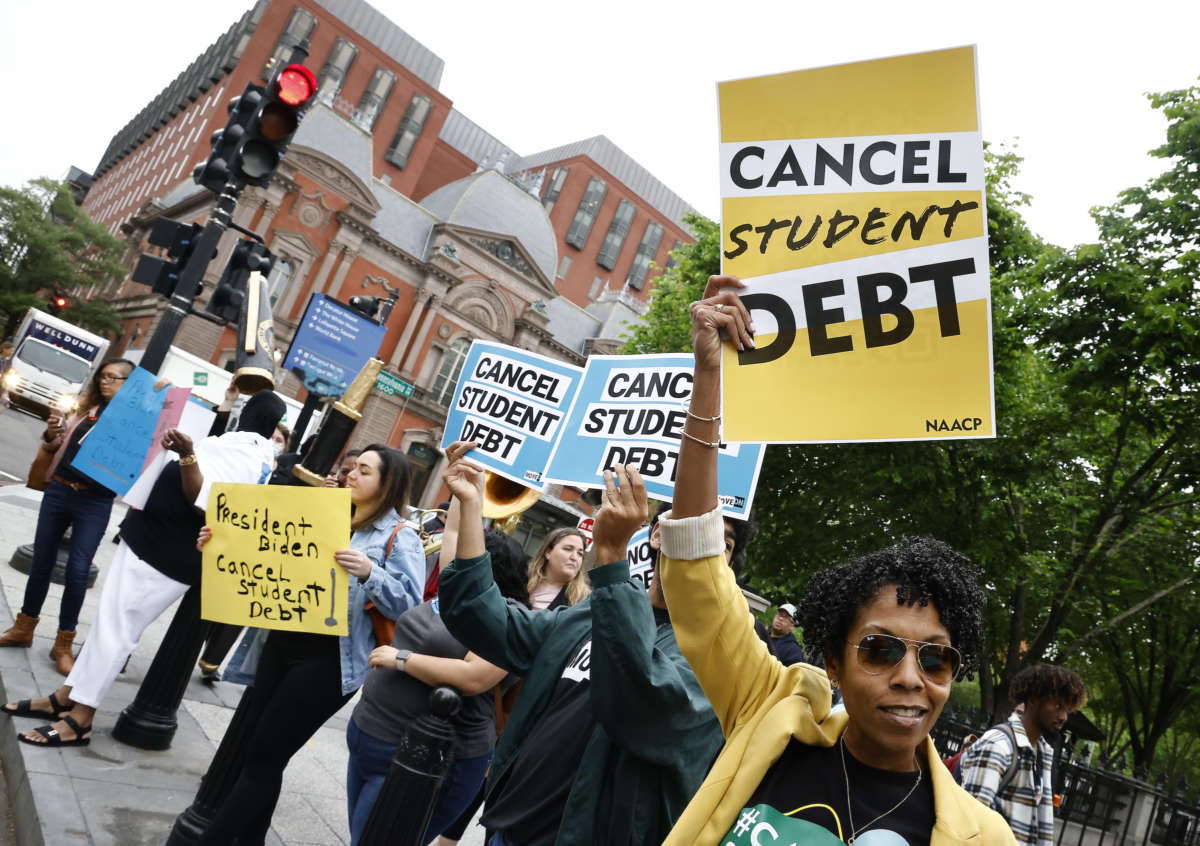Honest, paywall-free news is rare. Please support our boldly independent journalism with a donation of any size.
Six Republican-led states filed a lawsuit on Thursday aiming to stop tens of millions of student loan borrowers from receiving relief from President Joe Biden’s debt forgiveness plan in one of Republicans’ first legal challenges to the plan.
Arkansas, Iowa, Kansas, Missouri, Nebraska and South Carolina are suing the Education Department, saying that the plan is too broad and “inherently unfair.” The lawsuit, filed in a Missouri federal court, argues that the plan is not “tailored to address the effects of the pandemic” on borrowers. They argue that loan servicers would also be hurt by the plan, especially MOHELA, Missouri’s student loan servicer and one of the largest student loan servicers in the U.S.
If successful, the suit could halt the plan that would grant up to $20,000 of debt relief to Pell Grant recipients and $10,000 for others making less than $125,000 a year.
This lawsuit was expected. Republicans have been warning of their plans to challenge the student debt relief plan, saying that it’s too expensive or that it overreaches the president’s power.
Proponents of student debt forgiveness say, however, that Republicans’ true motives are to keep the middle and lower classes poor or in debt; after all, Republican lawmakers have openly admitted that they oppose the debt forgiveness plan because it would reduce the military’s ability to recruit poor people who couldn’t otherwise afford higher education.
Advocates say that the GOP’s complaints over the cost of the plan are frivolous. Right-wingers have been citing the conservative-led Congressional Budget Office (CBO) estimate released earlier this week that the plan would cost $400 billion. But they often neglect to mention that the cost would be spread out over the next 30 years and is barely over half of what the U.S. spends on the Pentagon yearly — a cost that Republicans almost never complain about.
The calculation for what revenue student loans may provide for the government may also be overblown; a July report from the Government Accountability Office found that, despite previous estimates, federal student loan borrowing actually costs the government billions of dollars, in part because many borrowers simply can’t afford to pay their loans back.
“Corrupt politicians are doing the student loan industry’s dirty work. A judge will quickly dispose of this sham lawsuit, but we won’t forget,” the Student Borrower Protection Center said on Thursday. “Banks and student lenders — especially MOHELA — want to profit by trapping families in debt. We will hold them accountable.”
“Republicans want to keep you in debt for the rest of your life and take away student debt cancellation,” wrote the Debt Collective on Thursday, in response to the lawsuit. “It is an interesting strategy to adopt before the midterms.”
Indeed, polls have found that the student debt plan is popular. Polls have found that a majority of Americans support the plan and that nearly half of voters say they’re more likely to vote this fall because of the plan that’s likely helped to boost Biden’s approval rating.
This is at least the second lawsuit filed over the plan. Earlier this week, a lawyer for a libertarian law firm, the Pacific Legal Foundation, filed a suit arguing that it would cause him harm because he would be forced to pay state taxes on the cancellation. In a legal filing in response to the lawsuit, Biden administration officials simply said that the lawsuit’s argument is moot because the forgiveness plan gives borrowers an option to opt out of the relief.
In an op-ed published Wednesday, The Washington Post’s Paul Waldman wrote that the attempt to stop student debt forgiveness is “upside-down class war” — a war waged by upper class and elite Republicans against middle- and low-income, Black and Latinx and young people to take away a rare bit of relief given to them by a political system that is designed to sap wealth away from everyday people to fund the 1 percent.
Though the legal challenges to the plan are only in their beginning phrases, the Biden administration already appears to be caving to them.
Reports noted on Thursday that the Department of Education has covertly changed the terms of the forgiveness plan to exclude the roughly 4 million borrowers who have privately held student loans, including those with Perkins loans and Federal Family Education Loans (FFEL), despite the fact that earlier iterations of the plan included such borrowers. Legal experts say that the Education Department appears to have made this change in bracing for legal challenges to the plan.
“FFEL lenders have shown their true colors,” the Student Borrower Protection Center wrote on Thursday. “Instead of working in the interest of student loan borrowers — their customers — these lenders are holding hostage relief from millions in order to keep making a buck off of suffering.”
A terrifying moment. We appeal for your support.
In the last weeks, we have witnessed an authoritarian assault on communities in Minnesota and across the nation.
The need for truthful, grassroots reporting is urgent at this cataclysmic historical moment. Yet, Trump-aligned billionaires and other allies have taken over many legacy media outlets — the culmination of a decades-long campaign to place control of the narrative into the hands of the political right.
We refuse to let Trump’s blatant propaganda machine go unchecked. Untethered to corporate ownership or advertisers, Truthout remains fearless in our reporting and our determination to use journalism as a tool for justice.
But we need your help just to fund our basic expenses. Over 80 percent of Truthout’s funding comes from small individual donations from our community of readers, and over a third of our total budget is supported by recurring monthly donors.
Truthout has launched a fundraiser to add 460 new monthly donors in the next 8 days. Whether you can make a small monthly donation or a larger one-time gift, Truthout only works with your support.
